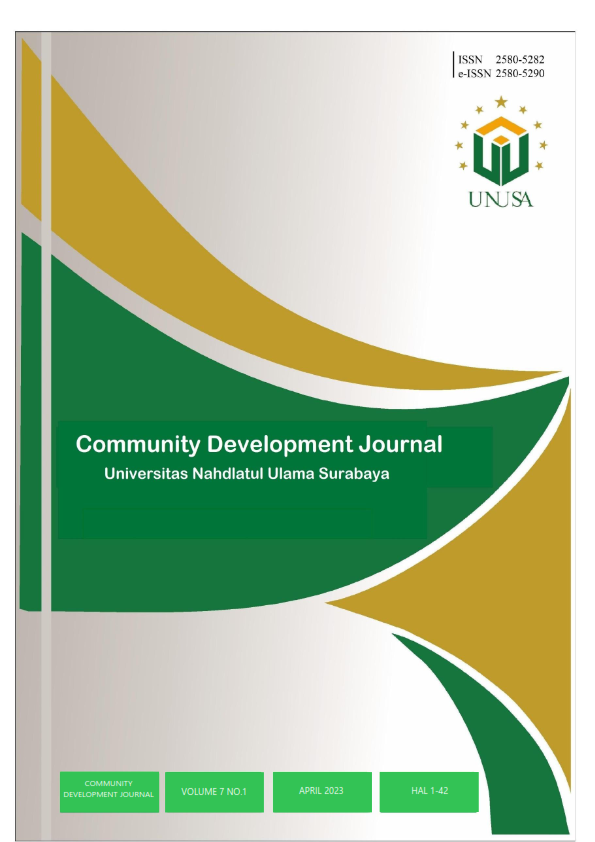Empowering Micro and Small Enterprises Legal for Halal Certification in Tajungan Village Kamal Bangkalan
##plugins.themes.bootstrap3.article.main##
Abstract
Halal Certificate is one of the obligations of businessmen regulated in Law Number 33 of 2014 concerning Guarantees for Halal Products. This law obliges all commodities circulating in Indonesia must be halal certified, including products of micro and small enterprises. Therefore, this community service program was carried out with the aim of socializing the mandatory of halal certification with the target of micro and small business enterprisers in Tajungan Village, Kamal District, Bangkalan Regency. The ultimate goal is the registration of halal certificate for micro business products in the region. The program applied education method by conducting separately the halal product processing trainings both for Universitas Trunojoyo Madura students in order to be certified halal counselors and micro and small enterprisers. The counselling for Halal Product Processing was carried out by gathering micro and small enterprisers at the Tajungan Village Office, Kamal District, Bangkalan Regency. They were educated to make them convince toward the urgency of halal certification, to persuade them for applying for halal certification through the self-declaration mechanism at which free of charge and to assist them directly in registering halal certificate. This program was warmly welcomed by women micro and small enterprisers in Tajungan Village because most of them were on average less educated but they were eager to obtain halal product certificates. As the result, the students’ counselors succeeded in legally registering ten micro and small enterprisers in Online Single Submission (OSS) website and registered their products to receive halal certificate through sihalal website. Therefore, halal education for micro and small enterprisers must still be carried out to encourage their desire to become part of the halal product guarantee system that is obliged by the law.
Downloads
##plugins.themes.bootstrap3.article.details##
Copyright (c) 2023 Indah Purbasari, Murni Murni, Azizah Azizah, Faris Hamidi, Qolbian Rohim

This work is licensed under a Creative Commons Attribution-ShareAlike 4.0 International License.
References
Hasana, A., Siregar, B. B. S., Wicaksono, H. A., Sya’baniyah, L., & Atifa, Z. (2021). Peningkatan Kualitas Umkm Kabupaten Pati Melalui Pengenalan Sertifikasi Halal. Indonesia Journal of Halal, 4(2), 67–70. https://doi.org/10.14710/halal.v4i2.14695
Hidayatullah, M. S. (2020). Sertifikasi dan Labelisasi Halal Pada Makanan dalam Perspektif Hukum Islam (Perspektif Ayat Ahkam). YUDISIA : Jurnal Pemikiran Hukum Dan Hukum Islam, 11(2), 251. https://doi.org/10.21043/yudisia.v11i2.8620 DOI: https://doi.org/10.21043/yudisia.v11i2.8620
Istianah, I., & Dewi, G. (2022). Analisis Maṣlahah Pada Konsep Halal Self-Declare Sebelum Dan Pascaenachtment Undang-Undang Cipta Kerja. Al-Adl : Jurnal Hukum, 14(1), 85. https://doi.org/10.31602/al-adl.v14i1.5870 DOI: https://doi.org/10.31602/al-adl.v14i1.5870
Mahardika, G. B., Nahara, A. R., & Gunawan, S. (2022). Titik Kritis Halal Olahan Natural Products sebagai Bahan Aditif Pangan. Halal Research Journal, 2(2), 112–119. https://doi.org/10.12962/j22759970.v2i2.424 DOI: https://doi.org/10.12962/j22759970.v2i2.424
Malik, E., Hasan, W. A., Astuti, T., R, M. R., & Kusi, A. (2022). Empowerment of Fishing Women Group Through Processing of Fish Products in Lowu-Lowu Sub-District. Community Development Journal, 6(2), 9–14.
Mardlotillah, R. R., Permana, E. B., Karya, D. F., Putra, R. S., Khusnah, H., Zhulqurnain, M. R. I., & Mariati, P. (2022). Halal Certification Training as an Effort to Increase Customer Satisfaction in the Start-Up Business of UNUSA Students. Community Development Journal, 6(2), 52–56. https://doi.org/10.33086/cdj.v6i2.2980 DOI: https://doi.org/10.33086/cdj.v6i2.2980
Puspita, N. F., Hamzah, A., Zuchrillah, D. R., & Karisma, A. D. (2021). Pendampingan Menuju Sertifikasi Halal pada Produk “Socolat” UMKM Pondok Modern Sumber Daya At-TaqwaPu. JPP IPTEK (Jurnal Pengabdian Dan Penerapan IPTEK), 5(1), 17–24. DOI: https://doi.org/10.31284/j.jpp-iptek.2021.v5i1.1611
Reza Adiyanto, M. (2020). Pemberdayaan Usaha Mikro Dan Kecil Terdampak Pandemi Covid – 19 Desa Paseseh Tanjung Bumi Bangkalan. Community Development Journal, 4(2), 178–183. https://doi.org/10.33086/cdj.v4i2.1761 DOI: https://doi.org/10.33086/cdj.v4i2.1761
Warto, W., & Samsuri, S. (2020). Sertifikasi Halal dan Implikasinya Bagi Bisnis Produk Halal di Indonesia. Al Maal: Journal of Islamic Economics and Banking, 2(1), 98. https://doi.org/10.31000/almaal.v2i1.2803 DOI: https://doi.org/10.31000/almaal.v2i1.2803
Yuyun, U. Y. T., Idris, N. C., & Vebrianti, J. (2022). Culinary Business Management Strategy Through Fish-Based Food Processing Training in Randusari Village, Semarang District. Community Development Journal, 6(1), 34–38. https://doi.org/10.33086/cdj.v6i1.2748 DOI: https://doi.org/10.33086/cdj.v6i1.2748

